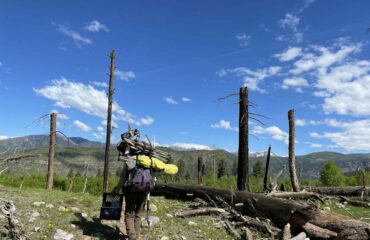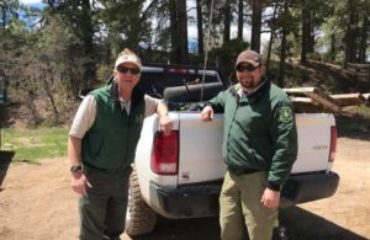
Those of us who cherish the San Juan Mountains are familiar with the term “loved to death”. We’ve seen photos and stories of beautiful places around the world being carelessly degraded by throngs of tourists. We don’t want this to happen here, and it doesn’t have to.
Yes, more people are learning about our little slice of heaven, and the number of hikers, backpackers, and peak baggers has skyrocketed in the last few years. But the impacts on the land don’t have to increase so long as we educate visitors about how to visit with respect.
Educating trail users is the main goal of San Juan Mountains Association’s (SJMA) Forest Ambassadors and San Juan Volunteers. The vast majority of visitors who disrespect our favorite places do so because they honestly don’t know any better. Yes, they could have done more research preceding their trip, but they didn’t. Instead of berateing these people, we have genuine conversations with them which leads to positive interactions and grateful people who will help spread the word.
An important thing to remember when visiting any wild place is that we don’t live there. As the Wilderness Act of 1964 states, true wilderness is “an area where the earth and its community of life are untrammeled by man, where man himself is a visitor who does not remain”. The plants live there. The animals live there. The rivers and springs flow freely. Humans are not a natural part of this ecosystem; therefore, it is important that we do our best not to impact it.
Recently, in a partnership with the San Juan National Forest (SJNF), SJMA, and the Durango & Silverton Narrow Gauge Railroad (D&SNGRR), an old educational program has been resurrected – the Chicago Basin volunteer basecamp. The goal is to reach more visitors and provide them with tips on how to respect this incredible place. Volunteers take the train to Needleton and then hike up to the camp with a lighter pack than usual since the camp already contains some necessities and luxuries.
The basecamp has a long history – so long that even the original mastermind of the camp, Kathe Hayes, can’t remember what year it started. I first helped set up the camp in 2011, after it was already well established, and participated in several set-ups and break-downs. We typically used llamas to pack the gear up there in mid-June. Then, in early September, would use horses to haul the gear out. All of this is made easier with cooperation from the railroad.
The volunteers in Chicago Basin focus on the 4 W’S – wildlife, water, waste, weather, and snags. For a boatload of details about how to respectfully visit Chicago Basin, go to sjma.org or do an internet search for the Chicago Basin Trip Planning Guide. Here are the 4 W’S in a nutshell:
- Wildlife: Mountain goats and marmots in the area are habituated to humans and will approach campers. They love salt. Marmots will chew on anything salty – trekking poles, boots, backpack straps, etc. Mountain goats love salt and other minerals in human urine. Seriously. It’s important to pee in flat rocks or rotting logs. If humans pee on vegetation, the goats will tear up the plants in an attempt to get the salt.
- Water: The land and plants that surround water sources make up less than 1% of the landscape and vegetation. It is important to camp, eat, and “go to the bathroom” at least 100 feet away from water in order to protect the ecosystem that lives there all year-round.
- Waste: Human waste should be packed but can also be buried 6 to 8 inches underground. All trash and toilet paper must be packed out. This includes all food scraps – even sunflower seed shells, fruit peels, and anything accidentally dropped on the ground. This can attract ant colonies or make wild animals sick.
- Weather: Afternoon thunderstorms are common from late June until mid-September. Plan accordingly to be in a safe place and prepare for a drop in temperature.
- Snags: There are many dead trees due to a previous spruce beetle infestation. Be sure to camp where dead trees are not going to fall on you.
No matter where you recreate outdoors, you are always a visitor. These guidelines apply to everyone. No one wants to love a place to death. Many people just haven’t been educated. Don’t be afraid to have a conversation with people. This is how we can all begin to take care of these magical places. And if you think you want to volunteer for the basecamp in Chicago Basin, email Erica Tucker, etucker@sjma.org or go to sjma.volunteerlocal.com/volunteer/
MK Thompson has been with SJMA since 2009 and currently serves as a Forest Ambassador. Contact her at artofmisadventure@gmail.com



